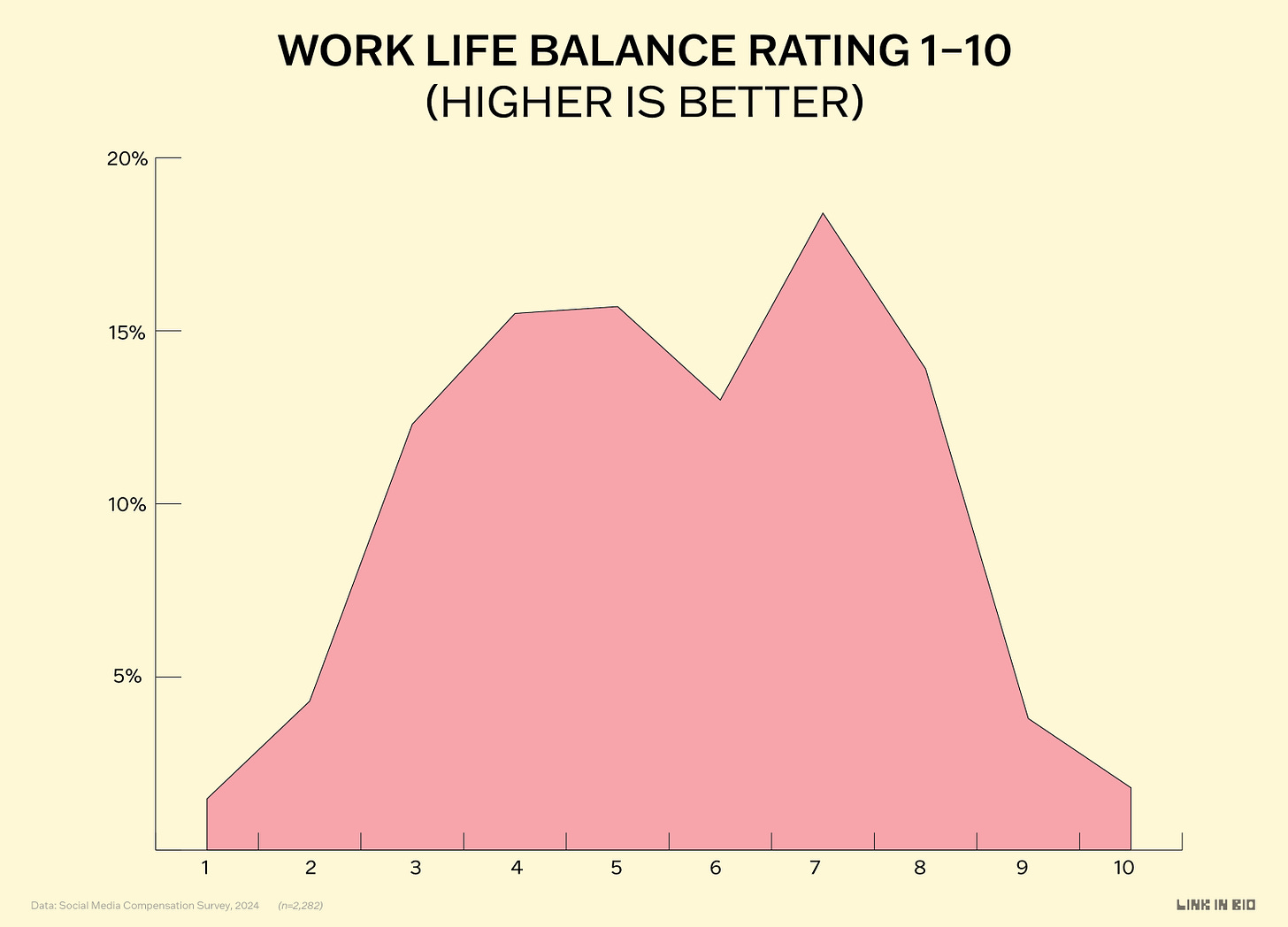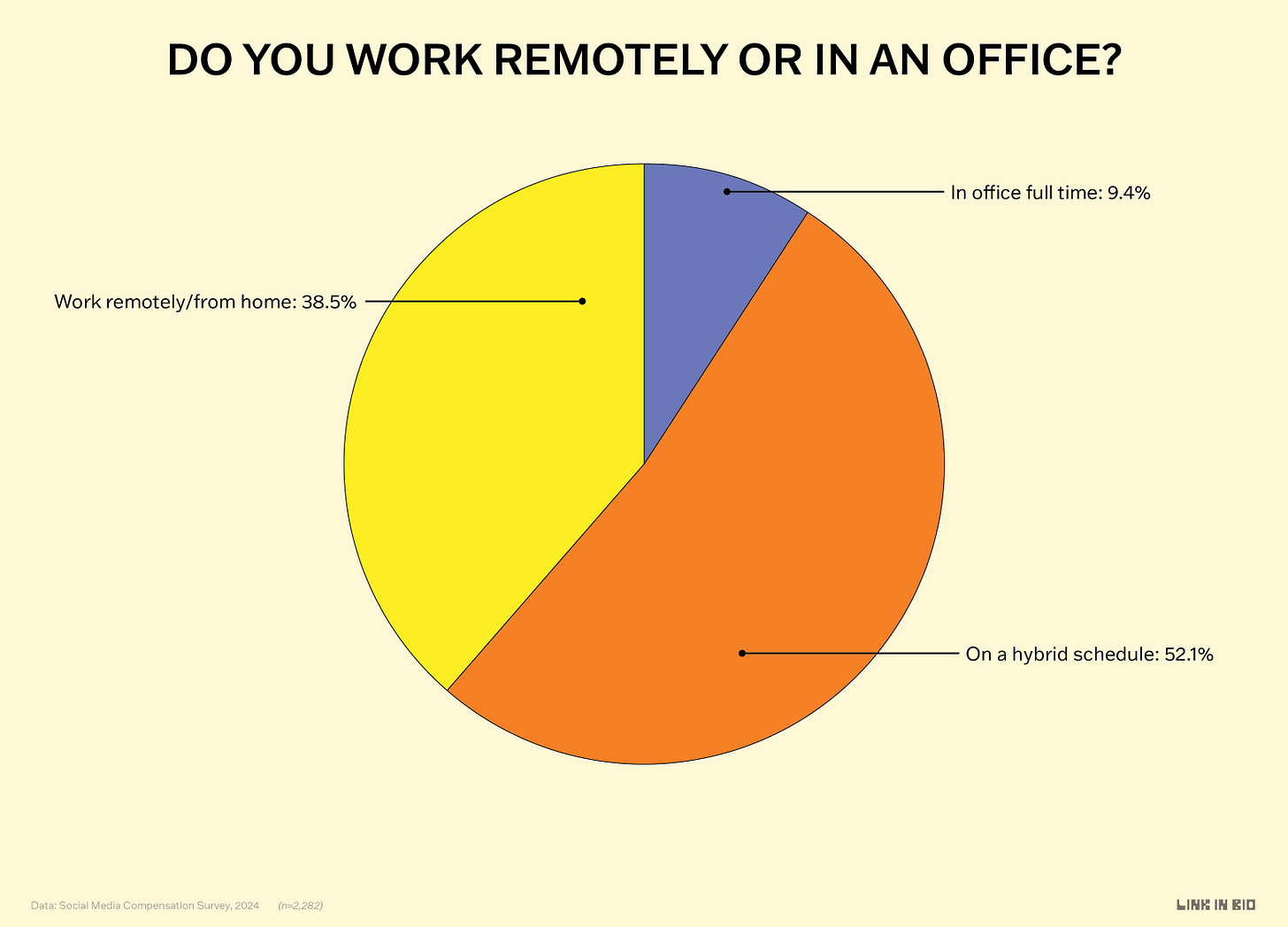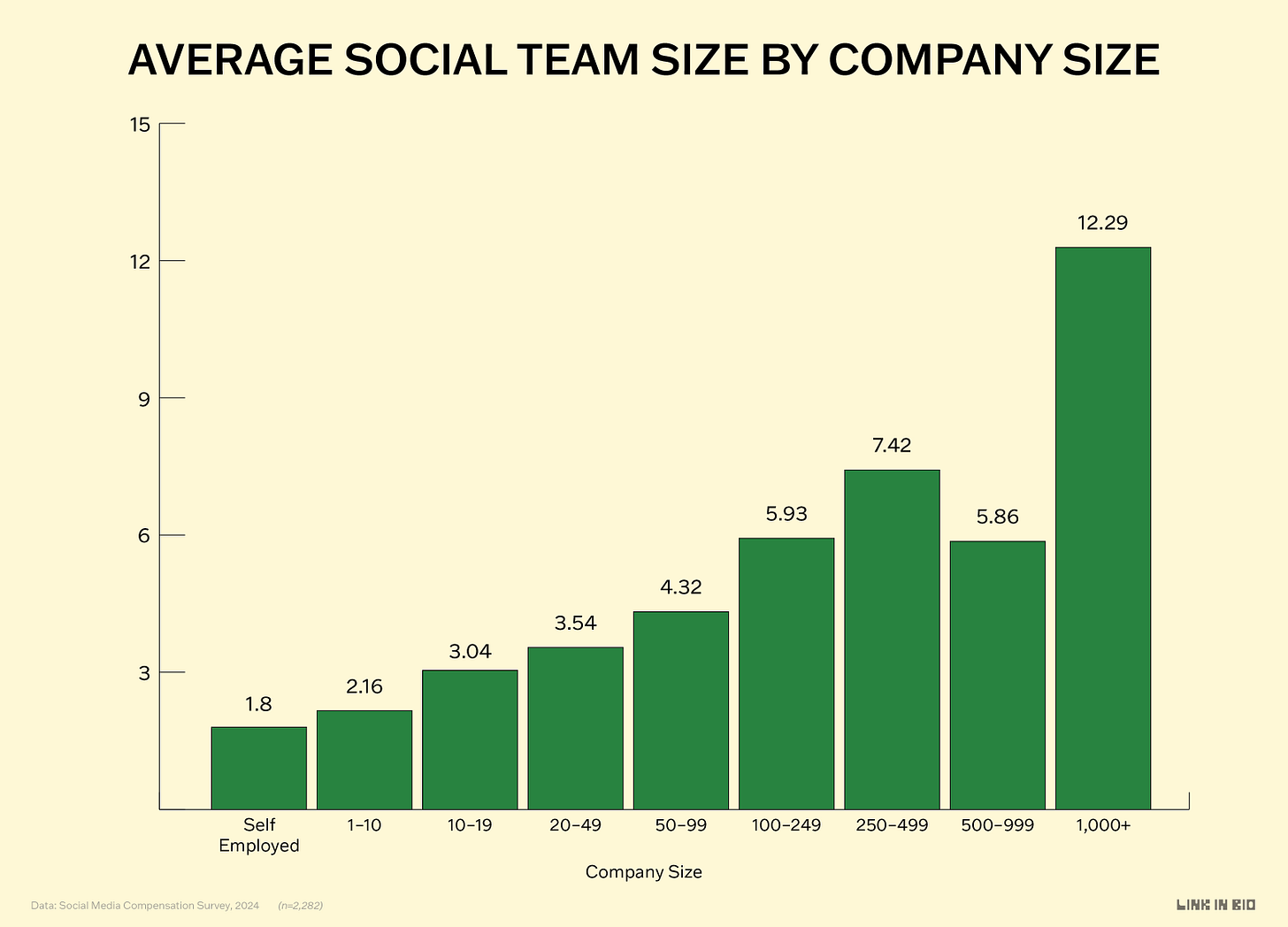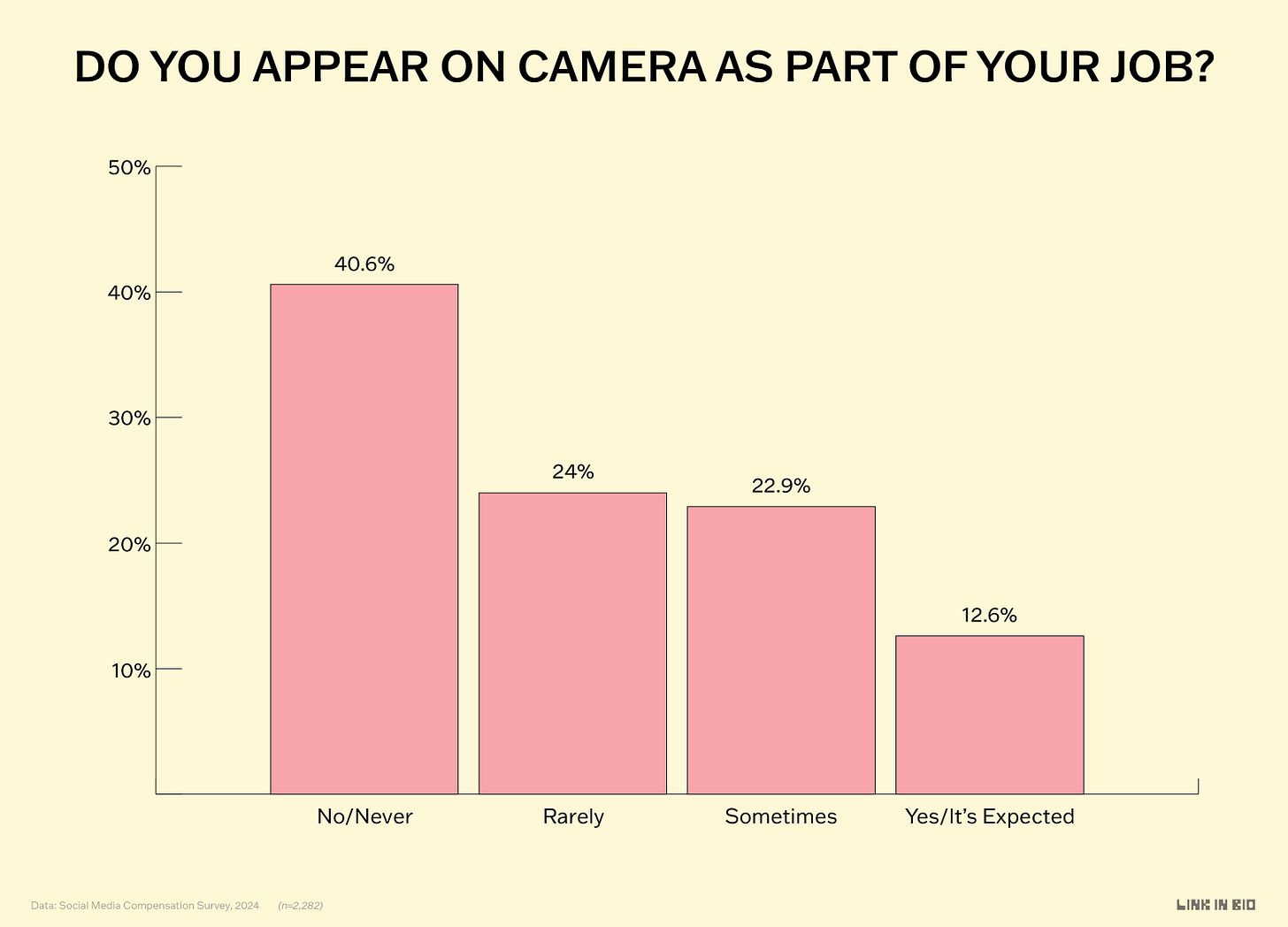Half of Social Media Managers Want to Change Jobs
Part two of the 2024 Social Media Compensation Survey results.
A few weeks ago we published the initial results from the 2024 Social Media Compensation Survey. It got into the money side of things—showing how you compare to your peers when looking at years of experience, industry, and job title. The goal was really for you to be able to get a social media industry salary benchmark from the data. We’ve heard from so many of you that it’s already been a helpful resource.
Today we’re doing a deep dive into how we are all feeling working in social media. Just how burnt out are social managers? Are we striking a great balance between our work and personal lives? What’s the average size of a social media team? How do the salaries of people in unionized vs non-unionized roles differ? How many people are looking to leave the industry altogether? We’ll be answering all of these questions (and more!) in this newsletter. Let’s dig in.
- Rachel Karten and Mitch Goldstein
Burnout Is a Big Worry
Almost 81% of respondents in the survey worry about getting burnt out in their current role. Themes of stress, overwork, being unable to log off, and similar sentiments prevailed through most comments and feelings that people shared. This was across roles and titles, industries, location, and salary bands. There is no easy solve for this. Social remains an industry that “never sleeps” but that doesn’t mean we don’t need sleep! Lots of responses pointed to lack of staffing and team structures to allow rotation of responsibilities and assistance when needed, and many noted a lack of headcount or support being a key cause of burnout.
Concerns about mental health remain an issue in the industry and should be taken seriously. It is easy for us to say “log off and touch grass” but there is a reason there is usually a semi-sarcastic “lol” tacked on to the end of those kinds of messages, unfortunately. We know it's not easy to do! We hope surveys like this help shine some light on the issues facing social professionals in their day to day work and can help you advocate for more resources where you need them to make your job doable in the long term.
Raises, Promotions, and Workloads
Most respondents feel like they’re working beyond their job descriptions, taking on the responsibilities of more than one person, and not getting recognition for the amount of work they’re taking on. While workloads have increased, only about a quarter of respondents have received a promotion.
However, more than half of respondents have received a raise in salary in the last 12 months. On average, respondents saw raises of about 14%. For context, that would be going from a salary of $80,000 to $91,200, an increase of $11,200.
We also heard in comments that social roles and titles are being asked to take on more and more non-social specific responsibilities, ranging from other platforms outside of typical social channels, like Discord and WeChat, to display, search, and SEO ads on Google, to newsletter marketing via MailChimp or Substack, and more.
Always On
Only 2.9% of respondents feel like they’re striking a great balance between work and their personal lives (responding a 9 or above in the question above), while almost half of all respondents ranked their work-life balance at a 5 or lower. We saw comments about needing to feel like you’re always on, accessible, and keeping an eye on channels and handles, as well as the lack of appreciation or respect for the amount of time social media work can take, with higher ups assuming getting a post up on a weekend is a quick or simple task.
“We should form a union!”
After our last email on the survey results, we saw a few replies saying “Social Media Managers really should just unionize already.” Only 6% of respondents to the survey are currently in a union, the largest share of which fall under Social Media Managers, of which 5% of which are unionized. With that result we wish we would’ve included a “have you ever thought about or started organizing a union” question.
The chart above examines salaries for Social Media Managers only. While only 5% of SMMs in the survey are part of a union, their average salary is 6.3% higher than those who are not. While it's not a massive difference in base pay, being unionized also offers additional protections including better benefits and working conditions, and improved severance packages should your job ever be cut. We’ve heard from both this survey and the last compensation survey that negotiating your salary or a raise is tricky, especially given the vacuum of information (which is why we’re doing this survey in the first place!) Being part of a union means that you can bargain collectively to ensure better pay equity and fair compensation for your labor, instead of negotiating by yourself to management.
The largest union representation came from the nonprofit space, with a close second in education and academia, both sectors that have a longer history with organized labor than more recent movements in tech and video game industries, as well as the growing trend towards unionization in news and media.
The Return to Office
About 60% of respondents are back to an office, either full time or on a hybrid basis. Those that are on a hybrid basis are split, with 46.5% of respondents in the office two or less days a week, and the remainder in three to four days a week. Most hybrid workers, 39.77%, are in the office three days a week.
Most folks working on social media would argue that we could work anywhere with a steady wifi connection and an outlet, especially those who are doubling as content creators and are out in the world on location to capture photos and videos. Interestingly, among those going into an office, results were close to 50/50, with 53% reporting they’d like more flexibility to work remotely and 47% happy with their current hybrid or in-office situation.
Managing in Social Media Management
41% of survey respondents are managers with at least one direct report, with some reporting managing teams of up to 15+. Given the still evolving and constantly changing nature of social media work, it helps to have someone leading your team who has also had hands-on-keyboard social media experience before.
Having a boss who “gets it” with regards to what is worth pursuing or spending time and resources on, versus ones who might still just see social media as an afterthought, can make a big difference both professionally and in personal fulfillment with your work. For those considering management as the next step in their career, there is also the financial incentive. Those who manage a team have an average salary of $110,484.23 compared to $82,907.78 for individual contributors or other non-managers.
Are You Ready For Your Close-Up?
Almost 60% of respondents appear on camera as part of their role. With the rise of short form video, from TikTok to YouTube Shorts to Instagram Reels, as part of our workload, we’re being asked to not only take part in the creative process but appear as a face, voice, or in many cases hands, of the brands, clients, and companies we work for. We’ve seen followers and fans become attached to Social Media Managers who become de facto mascots, and tiny microphones have become part of the standard kit for social and content teams everywhere. This trend is unlikely to go away, but that doesn’t mean everyone is comfortable about it! [Speaking as an anonymous smiley face on the internet, count me out! – Mitch]
As Link in Bio has recommended before, if you’re appearing on camera quite a bit as part of your job, you might want to consider putting a talent contract in place.
Life After Social
Almost 50% of respondents said they plan to keep working in social media, but that means the other 50% are either unsure (43.9%) or want to change lanes entirely already (6.3%). Those that are considering getting out mention being burnt out, not getting paid their worth, and wanting to pivot to a more broad marketing role.
There were also quite a few people who mentioned the societal impact of social media. With quotes like, “I also see its flaws and the negatives it's brought to society more frequently” and “The more I work in social media, the more I'm becoming convinced that social media is really bad for us, as a society. Ethically, I no longer want to be part of the problem.”
The main negative feedback from people who do plan to stay in social media was that they like it but want to move to a different industry. At Link in Bio, we talk a lot about how the industry you do social within can have a huge impact on your overall experience. It can always be worth chatting with social folks from other industries to hear what the broader culture of their industry is like.
Updates to Part One of the 2024 Social Media Compensation Survey
Finally, we wanted to share a few updates to the initial results newsletter we sent a few weeks ago. There were a few topics we wanted to double-click into, along with some reader requests.
There is now a graph that outlines median salary by locale. We divvied up salaries by major and non-major cities within and outside of the United States.
We compared men’s and women’s salaries after noticing a few trends in the data. Even though men made up only 12.8% of respondents, they are on average being paid more across almost every job title and they have a higher likelihood of holding more senior titles like Director of Social Media, where men were almost twice as likely to hold that title, or VP of Marketing.
There is now a graph that shows salary by race. While the dataset was less diverse than we’d like to have seen, what was reassuring is that there were no eye-popping pay disparities (but not zero) between races.
Thank you again to everyone who filled out the Link in Bio Social Media Compensation Survey. I am hopeful that the data Mitch and I outlined today and a few weeks ago will lead to more transparent conversations around salary, burn out, and the culture of working in social media. Our data was only as good as your answers—so thank you.
Link in Bio will be conducting this survey annually—which will (finally) allow us to report on YoY trends and themes. Social media is still a relatively new industry and creating historical data will help us better understand where it’s been and where it’s going. Thank you to Mitch Goldstein for helping design the survey and translate the data! Lucky to work with someone who understands social and numbers so well.
Finally, I know some of the data throughout these newsletters has been…bleak. I view it as a starting point. Now we know how we are all feeling—what can we do to make this a sustainable industry for ourselves and future generations? In the next month I will share some of the written responses we received in the survey and a few actionable steps we can all take to keep pushing social media marketing forward.
As always, thanks for subscribing and you can support free resources like this with a paid subscription.
















yeah not surprising
After 10 years, I applied to grad school and I’m pivoting to an entirely new career and industry. The work-life balance was awful and the toll it took on my mental health was far too high. I’ve kept an eye on job boards for something more flexible while I’m in school, and all I see are open positions for social media managers, content creators, and adjacent positions. There is such high turnover and many people are too disillusioned (I am one of them) and don’t want these jobs anymore. I am interested in the idea of unionizing, however. That might alleviate many of our collective problems!